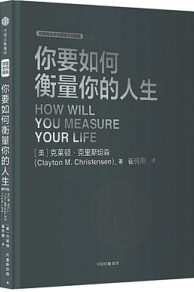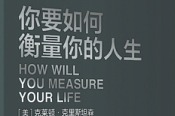Book helps to get a read on the measure of a successful life


For the many avid readers who hope to find some solutions to life's questions through reading, a newly-published Chinese-English bilingual version of How Will You Measure Your Life by Clayton Christensen, a professor at Harvard Business School in the United States, might provide a few answers. It has been released as part of a series of books, entitled Harvard Business Review Classics.
The book is based on a speech he first gave in 2010, after he managed to survive a heart attack, early-stage cancer and a stroke in a three consecutive year period. Christensen, born in 1952 in Salt Lake City, was described as one of the most influential business theorists in the past five decades by Forbes, and was named by Thinkers50-a ranking organization for global business thinking-as the top "management thinker" in both 2011 and 2013. The professor of business administration has written eight critically acclaimed books, including bestsellers The Innovator's Solution and Disrupting Class.
In How Will You Measure Your Life, the book's author raises three questions-How can I be sure that I'll be happy in my career? How can I be sure that my relationships with my spouse and my family become an enduring source of happiness? How can I be sure I'll stay out of jail?
He then provides his insights into them by using lessons from some of the world's greatest businesses.
Christensen's ideas have inspired numerous people around the globe. Roan Kang, general manager of marketing and operations of Microsoft's Greater China Region, is one of them. He was lucky to have met the author himself when Christensen delivered a speech to Kang's company a few years ago.
"I agree with Christensen's point that too many people use material wealth or social status as ways to measure success, while in reality, it is doing purposeful work that helps others and improves society that is truly meaningful," Kang says, adding that he hopes the book will inspire more young people.
Kang, 45, also supports Christensen's idea that "your time is the most precious of resources", which he says, is something he learned firsthand while working with Bill Gates.
"After you've figured out what your top priorities are in life and in your work, you have to be disciplined and make sure you constantly put your time into those priorities."
Christensen accentuates in the book that it's important to play an active and engaging role in the growth of your children.
A father of two, Kang believes that children are born with their own personalities and predilections, but that their values and the way they approach life are learned from others. "Those values can either be instilled by their parents, or they will be by somebody else if you do not take an active role in doing so," he says. Kang also agrees that investing in, and nurturing, your relationships with family and friends is one of the most important things you can do as a person.
Kang joined Microsoft in 2002 and won the company's Platinum Circle of Excellence award in 2015, an accolade given to less than 1 percent of its employees.
"Professor Christensen calls for everyone's career path to be a 'balance of calculation and serendipity', which is true to me-you can only control how well you prepare yourself, strengthen yourself and gain from your experiences, so that when opportunities arise, you are ready to grab them by competing as hard as you can."
Kang has been a voracious reader of all sorts of material from a very young age. He not only reads newspapers and magazines regularly, but also reads books across a wide spectrum of genres, from science to history, biographies, fiction, and books related to his work, on subjects such as artificial intelligence algorithms or digital transformation applications.
"I believe that reading broadly helps me to be a better business leader, because I am able to synthesize the major technical, economic, political and historical trends when I need to make decisions about our business," he says.
Besides Christensen's tome, Kang also recommends that college students read more books that he has found insightful and thought-provoking such as Guns, Germs, and Steel by Jared Diamond, Sapiens by Yuval Noah Harari and The Structure of Scientific Revolutions by Thomas Kuhn.





































